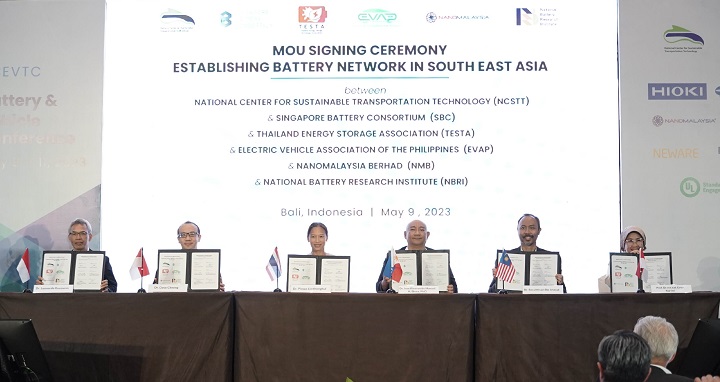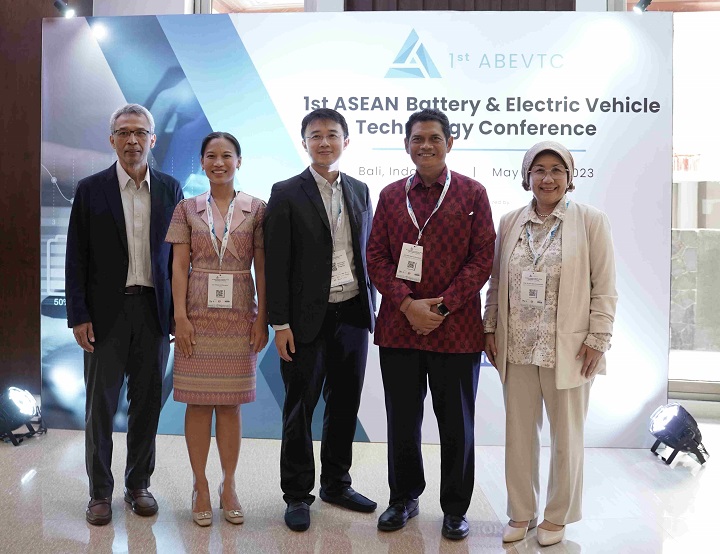
The ASEAN Battery and Electric Vehicle Technology Conference (ABEVTC) is officially underway in Bali, marking a significant milestone in the region’s drive towards sustainable transportation. With the aim of building vibrant ecosystems and strengthening partnerships among key players in the sectors of battery and electric vehicles (EV), this inaugural event is poised to achieve some key outcomes that are set to shape the future of the industry. Running from now until 11 May, the ABEVTC is expected to attract a diverse range of participants from across the ASEAN region and beyond.
Co-organized by the Singapore Battery Consortium, the National Center for Sustainable Transportation Technology (NCSTT) from Indonesia, and the Thailand Energy Storage Technology Association (TESTA), and also supported by Hioki E.E Corporation, a Japanese manufacturer for test and measuring instruments, the three-day conference will strive to bring new opportunities, innovative ideas, and exchange of knowledge amongst the professionals, academics and policy makers from ASEAN countries, and nourish relationships among industry players to build an ASEAN community for future collaboration.

The conference will highlight the signing of a Memorandum of Understanding (MOU) between the six leading associations in the region to explore research and development collaboration activities in the area of batteries. The parties intend to jointly develop and promote an ASEAN Battery Ecosystem that will facilitate the growth of the battery industry in the region.
The six associations are Singapore Battery Consortium (SBC), National Center for Sustainable Transportation Technology (NCSTT) from Indonesia, and Thailand Energy Storage Technology Association (TESTA), National Battery Research Institute (NBRI) (Indonesia), NanoMalaysia Berhad and Electric Vehicle Association of the Philippines (EVAP). They have committed to working together to enhance the research and development capabilities of the region’s battery industry, and to foster greater collaboration among industry players.
Dr. Davy Cheong, Director, Singapore Battery Consortium said, “ASEAN is an increasingly important region in the global ecosystem of battery and electric vehicle in supply chain, manufacturing and R&D. This tie-up looks to bring various players together, to work in synergy, and provide the right platform for networking, discussions and collaborations.”
Dr. Pimpa Limthongkul, President Thailand Energy Storage Technology Association (TESTA): “The MOU signing ceremony on battery development between the 6 leading organizations in Southeast Asia is expected to help strengthen the collaboration within our region. It will be a good starting point for us all to move together towards economic prosperity in conjunction with sustainable development in an important and fast-growing industry.”
Dr. Leonardo Gunawan, Director of NCSTT: “We are looking forward and excited to collaborate with ASEAN institutions to develop and promote the ASEAN Battery Ecosystem as a significant step towards an integrated and sustainable transportation system in Indonesia. Our partnership will advance battery technology, safety, standards, and circular economy research to build a competitive transportation industry with strong national support. This will contribute to the success and growth of the region’s energy storage industry.”
Prof. Dr. ret. Nat. Evvy Kartini, Founder of National Battery Research Institute (NBRI): “Indonesia has great potential in the battery industry, with abundant reserves of nickel, manganese, and other minerals needed for battery production. The National Battery Research Institute (NBRI) is eager to enhance national capacity by mastering technology, improving human resources, and actively advising policy. The collaboration with other ASEAN organizations will further enhance Indonesia’s position as a key player in the regional battery market.”
Dr. Rezal Khairi Bin Ahmad, Chief Executive Officer of NanoMalaysia Berhad: “NanoMalaysia is excited to be part of the multilateral partnership between organizations leading the charge in EV and battery technologies in South East Asia to activate regional supply and value chains for electric vehicles components to make investment in the region more strategic and attractive and ownership of EV more affordable.”

(From left to right): Dr. Leonardo Gunawan, NCSTT; Dr. Pimpa Limthongkul, President Thailand Energy Storage Technology Association (TESTA); Dr. Chiam Sing Yang, Singapore Battery Consortium Dr. IGW Samsi Gunarta, Head of Department of Transportation (DISHUB), Bali, Indonesia Prof. Dr. rer. Nat. Evvy Kartini, Founder of National Battery Research Institute (NBRI)Other important agendas that are expected at this event are a roundtable discussion on decarbonization in ASEAN between regional leading academics in the field of the battery and electrification and two panel discussions on swapping technology and the circular economy in batteries.
Furthermore, there were keynote speeches from representatives of leading companies in the Energy Storage System & EV industry such as , UL Standards & Engagement (ULSE), Honda R&D Co.,Ltd (Japan), Mobility Open Blockchain Initiative (MOBI), ZF Japan Co., Ltd, PT Pertamina (Persero), and PT. Energi Kreasi Bersama (Electrum) as well as sharing sessions from more than 15 industry experts from HIOKI E.E. Corporation, ANWHA (Shanghai) Automation Engineering Co., LTD, Arthur D. Little, Indonesia Battery Corporation (IBC), CADFEM SEA Pte. Ltd., ULVAC Technologies, Inc, NanoMalaysia Berhad, Advanced Remanufacturing and Technology Centre (ARTC), Malaysia Automotive, Robotics and IoT Institute (MARii), Electric Vehicle Association of the Philippines (EVAP), and more.
The topics for the sessions include ASEAN Battery Collaboration, ASEAN Electric Vehicle Roadmap and Development, Swappable Battery and Energy Storage Systems, Battery Circular Economy, Design & Production Technology, Safety Test and Calibration.

